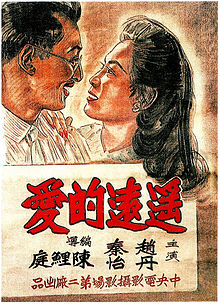Far Away Love
| Far Away Love | |
|---|---|
 |
|
| Directed by | Chen Liting |
| Written by | Chen Liting or Xia Yan |
| Starring |
Zhao Dan Qin Yi |
|
Production
company |
China Film No. 2 Studio
|
|
Release date
|
18 January 1947 |
| Country | China |
| Language | Mandarin |
Far Away Love (Chinese: 遙遠的愛; pinyin: Yáoyuǎn de Ài), also translated as Love of Far Away and Remote Love, is a 1947 Chinese film directed by Chen Liting. Made during the Republican era, it was produced by the state-owned China Film No. 2 Studio, and stars prominent actors and actresses Zhao Dan, Qin Yi, and Wu Yin. The film was well received, and its premiere in Shanghai is considered a landmark event in postwar Chinese cinema.
The film's screenplay is officially attributed to director Chen Liting, but according to Chen himself, it was in fact written by the leftist dramatist Xia Yan, whose authorship was concealed for political consideration.
After university professor Xiao Yuanxi 萧元熙 (Zhao Dan) breaks up with his girlfriend, he finds his maidservant Yu Zhen 余珍 (Qin Yi) an attractive, though unpolished, woman. He decides to transform Yu into his ideal woman. He teaches her modern etiquette and customs, and with his encouragement, Yu develops into an independent-minded modern woman. The two become married.
After the January 28 Incident in 1932, Yu Zhen wants to volunteer to care for the Chinese soldiers and refugees wounded in battle against the Japanese invaders, but is stopped by her husband. Yu later gives birth to a son, and Xiao hopes to have an ideal family life.
After the eruption of the Battle of Shanghai in 1937, Xiao flees Shanghai for Hankou in central China, while Yu insists on staying behind to help the war refugees. Yu eventually evacuates Shanghai, but on the way to Hankou her son dies in a Japanese bombing raid. The loss further steels Yu Zhen's mind and she joins the army.
When Yu finally reaches Hankou and reunites with Xiao, the couple have grown irreparably distant. Yu Zhen decides to leave Hankou for the frontline, whereas Xiao laments the transformation of his wife and turns against women's liberation.
...
Wikipedia
